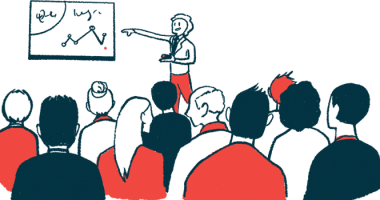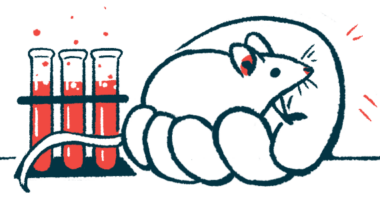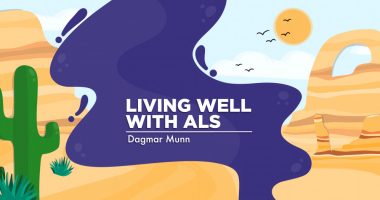ALS affects my hand strength, but it’s no match for my determination
Strategies and exercise have helped me discover what my body needs

There was a time when I could twist off the lid of a new jar of peanut butter with ease; I always enjoyed hearing that distinctive pop when the lids finally gave way. Pickles, spaghetti sauce, whatever: Those jars were no match for my grip strength and determination. Now, although I still have loads of determination, ALS has made my hands too weak to even try.
When my ALS symptoms first appeared in 2010, I remember how I struggled to press the nozzle on a lotion bottle with only my fingers and had to use a full hand instead. In the kitchen, I swore I faced an industrywide conspiracy as plastic sandwich baggies and food storage containers became nearly impossible to pry open. I waged daily battles with the suction of the refrigerator door, now requiring a two-handed, full-body “heave-ho-pull” to open it. And of course, the lid on the peanut butter refused to budge.
It seemed that everything I did was exhausting.
Think of a garden hose, water blasting full tilt onto the yard, when suddenly a kink develops along the line. You’re left holding a hose with nothing but a sad dribble of water. That’s precisely how I felt.
ALS was my “kink.” Although I knew I couldn’t remove or unravel it, I was determined to find a way to best use the lowered strength I was left with. My strategy focused on the following approaches.
Conserving my energy
First, I became selective about how I expended the muscle energy in my hands. I most needed to type on my computer, grip the handlebars of my rollator, grasp grab bars, and continue participating in my favorite hobby: knitting.
To free myself from the “energy wasters,” I took advantage of daily living hacks and accommodations recommended by my occupational therapist. They were simple hacks, such as getting dressed while sitting down and simplifying my clothes, with no more fighting zippers or fiddly buttons. An electric toothbrush replaced my old manual version, and straws would help me drink beverages without having to grasp a cup or glass.
Rejuvenate and restore
My second strategy was to look at exercise. My first impulse was to collect a bunch of online videos and devise routines to exercise the heck out of my hands, movements like squeezing a rubber ball and such. Wrong. I discovered that traditional strengthening exercises created more fatigue and less coordination.
I did find success and relief from doing gentle stretches and range-of-motion movements. Those keep my muscles, tendons, and joints supple. Plus, they’re relaxing.
Reconnecting brain and body
Also helpful is the series of movements called RESET, as taught by Original Strength. These are the fundamental movements we all experienced as infants. RESET follows a baby’s natural physical evolution, from wiggling the belly to lifting the head while arching up to rolling over to finally crawling.
When adults perform a RESET, we’re strengthening the muscles of our core: shoulders, chest, stomach, diaphragm, and upper, middle, and lower back. We’re also firing up our brain-motor neuron pathways as well as the system that controls our sense of balance. All these are good things for people with ALS.
These movements also affect the muscles of my upper arms and shoulders, which might over time become weak from disuse atrophy. Who knew that weakness in my hands would lead to me doing gentle, full-body workouts every day?
ALS affects each person differently, and not all therapies have the same effect on symptoms. I’m sharing what’s working for me — not to have you imitate exactly what I do, but to inspire you to listen to your body and discover what it needs.
Let’s continue to be active participants in the world around us and help each other learn how to live well with ALS.
Note: ALS News Today is strictly a news and information website about the disease. It does not provide medical advice, diagnosis, or treatment. This content is not intended to be a substitute for professional medical advice, diagnosis, or treatment. Always seek the advice of your physician or other qualified health provider with any questions you may have regarding a medical condition. Never disregard professional medical advice or delay in seeking it because of something you have read on this website. The opinions expressed in this column are not those of ALS News Today or its parent company, BioNews, and are intended to spark discussion about issues pertaining to ALS.








Comments
Dianne Knox
Thanks once again,Dagmar,for your wonderful words of inspiration!! Instead of focusing on the disappointment experienced with all our losses due to ALS,you always have great suggestions for remaining positive and continuing to live a full and engaged life !
Dagmar Munn
Dianne, I so appreciate knowing that what I write is inspiring you. Your support keeps ME going forward. Best wishes to you, Dagmar
Mary Jarrell
I was diagnosed with ALS recently, I couldn't believe how quickly my hand and upper body strength declined. It is inspiring to hear from long term survivors.
Linda
You are an inspiration I just have a problem getting motivated, I was diagnosed in April and since then I can't get moving. I used to be very active and social, not anymore. I'm on oxygen 24/7, use a walker to get around and I've been given a computer to learn to type with my eyes. My mind says yes and then the day is over and I haven't done anything that I wanted to. Any advice?.
Tim Federwitz
Great article and suggestions! Luckily, I still have kids at home to help me with many things, like opening jars. It was pretty emasculating the first time I had to ask my 11 yo daughter to open an already opened jar for me. LOL... I wasn't truly upset by it (I don't let much upset me TBH), but it definitely was one of those moments in life. On the upside, she was beaming that she could help her Dad vs me always helping her.